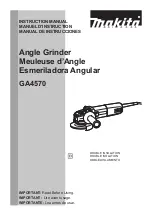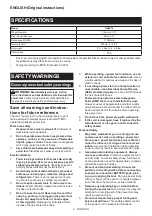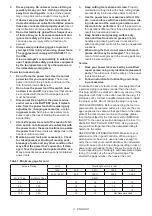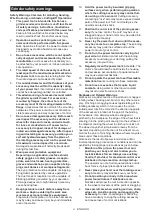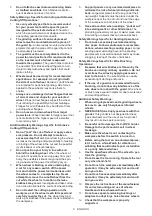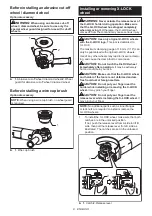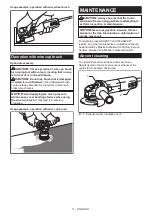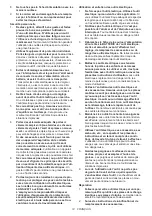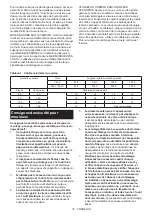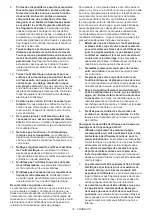
3 ENGLISH
6.
Dress properly. Do not wear loose clothing or
jewellery. Keep your hair, clothing and gloves
away from moving parts.
Loose clothes, jewel
-
lery or long hair can be caught in moving parts.
7.
If devices are provided for the connection of
dust extraction and collection facilities, ensure
these are connected and properly used.
Use of
dust collection can reduce dust-related hazards.
8.
Do not let familiarity gained from frequent use
of tools allow you to become complacent and
ignore tool safety principles.
A careless action
can cause severe injury within a fraction of a
second.
9.
Always wear protective goggles to protect
your eyes from injury when using power tools.
The goggles must comply with ANSI Z87.1 in
the USA.
It is an employer's responsibility to enforce the
use of appropriate safety protective equipment
by the tool operators and by other persons in
the immediate working area.
Power tool use and care
1.
Do not force the power tool. Use the correct
power tool for your application.
The correct
power tool will do the job better and safer at the
rate for which it was designed.
2.
Do not use the power tool if the switch does
not turn it on and off.
Any power tool that cannot
be controlled with the switch is dangerous and
must be repaired.
3.
Disconnect the plug from the power source
and/or remove the BATTERY pack, if detach
-
able, from the power tool before making any
adjustments, changing accessories, or stor
-
ing power tools.
Such preventive safety mea-
sures reduce the risk of starting the power tool
accidentally.
4.
Store idle power tools out of the reach of chil
-
dren and do not allow persons unfamiliar with
the power tool or these instructions to operate
the power tool.
Power tools are dangerous in the
hands of untrained users.
5.
Maintain power tools and accessories. Check
for misalignment or binding of moving parts,
breakage of parts and any other condition that
may affect the power tool’s operation. If dam
-
aged, have the power tool repaired before use.
Many accidents are caused by poorly maintained
power tools.
6.
Keep cutting tools sharp and clean.
Properly
maintained cutting tools with sharp cutting edges
are less likely to bind and are easier to control.
7.
Use the power tool, accessories and tool bits
etc. in accordance with these instructions, tak
-
ing into account the working conditions and
the work to be performed.
Use of the power tool
for operations different from those intended could
result in a hazardous situation.
8.
Keep handles and grasping surfaces dry,
clean and free from oil and grease.
Slippery
handles and grasping surfaces do not allow for
safe handling and control of the tool in unexpected
situations.
9.
When using the tool, do not wear cloth work
gloves which may be entangled.
The entangle-
ment of cloth work gloves in the moving parts may
result in personal injury.
Service
1.
Have your power tool serviced by a qualified
repair person using only identical replacement
parts.
This will ensure that the safety of the power
tool is maintained.
2.
Follow instruction for lubricating and chang
-
ing accessories.
To reduce the risk of electric shock, this equipment has
a polarized plug (one blade is wider than the other).
This plug will fit in a polarized outlet only one way. If the
plug does not fit fully in the outlet, reverse the plug. If it
still does not fit, contact a qualified electrician to install
the proper outlet. Do not change the plug in any way.
VOLTAGE WARNING: Before connecting the tool to a
power source (receptacle, outlet, etc.) be sure the volt
-
age supplied is the same as that specified on the name
-
plate of the tool. A power source with voltage greater
than that specified for the tool can result in SERIOUS
INJURY to the user- as well as damage to the tool. If in
doubt, DO NOT PLUG IN THE TOOL. Using a power
source with voltage less than the nameplate rating is
harmful to the motor.
USE PROPER EXTENSION CORD. Make sure your
extension cord is in good condition. When using an
extension cord, be sure to use one heavy enough to
carry the current your product will draw. An undersized
cord will cause a drop in line voltage resulting in loss of
power and overheating. Table 1 shows the correct size
to use depending on cord length and nameplate ampere
rating. If in doubt, use the next heavier gage. The
smaller the gage number, the heavier the cord.
Table 1: Minimum gage for cord
Ampere Rating
Volts
Total length of cord in feet
120V
25 ft.
50 ft.
100 ft.
150 ft.
220V - 240V
50 ft.
100 ft.
200 ft.
300 ft.
More Than
Not More Than
AWG
0 A
6 A
–
18
16
16
14
6 A
10 A
18
16
14
12
10 A
12 A
16
16
14
12
12 A
16 A
14
12
Not Recommended

